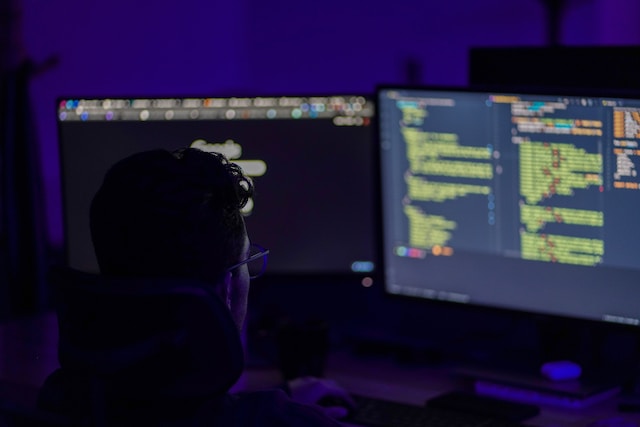DevSecOps Engineer vs. Detection Engineer
DevSecOps Engineer vs Detection Engineer: A Comprehensive Comparison

Table of contents
In the rapidly evolving landscape of cybersecurity, two roles have emerged as critical components in safeguarding digital assets: the DevSecOps Engineer and the Detection Engineer. While both positions play vital roles in an organization's security posture, they focus on different aspects of the cybersecurity spectrum. This article delves into the definitions, responsibilities, required skills, educational backgrounds, tools and software used, common industries, outlooks, and practical tips for getting started in these two essential roles.
Definitions
DevSecOps Engineer: A DevSecOps Engineer integrates security practices into the DevOps process, ensuring that security is a shared responsibility throughout the software development lifecycle. This role emphasizes collaboration between development, security, and operations teams to automate security measures and enhance the overall security posture of applications.
Detection Engineer: A Detection Engineer focuses on identifying and responding to security threats within an organization. This role involves developing and implementing detection strategies, analyzing security incidents, and creating alerts to ensure timely responses to potential breaches. Detection Engineers work closely with Incident response teams to mitigate risks and improve security measures.
Responsibilities
DevSecOps Engineer Responsibilities
- Integrate security practices into CI/CD pipelines.
- Automate security testing and vulnerability assessments.
- Collaborate with development and operations teams to implement security controls.
- Conduct threat modeling and risk assessments.
- Monitor and analyze security metrics to improve processes.
- Provide training and guidance on secure coding practices.
Detection Engineer Responsibilities
- Develop and maintain detection rules and alerts for security incidents.
- Analyze security logs and data to identify anomalies and potential threats.
- Collaborate with incident response teams to investigate security incidents.
- Conduct threat hunting activities to proactively identify Vulnerabilities.
- Stay updated on the latest attack vectors and security trends.
- Create and maintain documentation for detection processes and procedures.
Required Skills
DevSecOps Engineer Skills
- Proficiency in programming and scripting languages (e.g., Python, Bash).
- Knowledge of security frameworks and Compliance standards (e.g., OWASP, NIST).
- Familiarity with CI/CD tools (e.g., Jenkins, GitLab CI).
- Understanding of cloud security principles and tools (e.g., AWS, Azure).
- Experience with containerization and orchestration technologies (e.g., Docker, Kubernetes).
- Strong communication and collaboration skills.
Detection Engineer Skills
- Expertise in security information and event management (SIEM) tools (e.g., Splunk, ELK Stack).
- Proficiency in Log analysis and threat detection methodologies.
- Knowledge of network protocols and security technologies (e.g., Firewalls, IDS/IPS).
- Familiarity with scripting languages for Automation (e.g., Python, PowerShell).
- Strong analytical and problem-solving skills.
- Ability to work under pressure and respond to incidents effectively.
Educational Backgrounds
DevSecOps Engineer
- Bachelor’s degree in Computer Science, Information Technology, or a related field.
- Relevant certifications (e.g., Certified DevSecOps Professional, AWS Certified Security – Specialty).
- Experience in software development and IT operations.
Detection Engineer
- Bachelor’s degree in Cybersecurity, Information Security, or a related field.
- Relevant certifications (e.g., Certified Information Systems Security Professional (CISSP), Certified Ethical Hacker (CEH)).
- Experience in security operations or incident response.
Tools and Software Used
DevSecOps Engineer Tools
- CI/CD tools: Jenkins, GitLab CI, CircleCI.
- Security testing tools: Snyk, Aqua Security, Veracode.
- Configuration management tools: Ansible, Terraform.
- Monitoring tools: Prometheus, Grafana.
Detection Engineer Tools
- SIEM solutions: Splunk, LogRhythm, IBM QRadar.
- Threat intelligence platforms: Recorded Future, ThreatConnect.
- Endpoint detection and response (EDR) tools: CrowdStrike, Carbon Black.
- Network Monitoring tools: Wireshark, Zeek.
Common Industries
DevSecOps Engineer
- Technology and software development companies.
- Financial services and Banking.
- Healthcare and pharmaceuticals.
- E-commerce and retail.
Detection Engineer
- Financial institutions and banks.
- Government and defense organizations.
- Healthcare providers.
- Managed security service providers (MSSPs).
Outlooks
The demand for both DevSecOps Engineers and Detection Engineers is on the rise as organizations increasingly prioritize security in their digital transformation efforts. According to industry reports, the global DevSecOps market is expected to grow significantly, driven by the need for secure software development practices. Similarly, the cybersecurity workforce is projected to grow, with a particular emphasis on detection and response capabilities to combat evolving threats.
Practical Tips for Getting Started
-
Gain Relevant Experience: Start with internships or entry-level positions in software development, IT operations, or cybersecurity to build foundational skills.
-
Pursue Certifications: Obtain relevant certifications to validate your skills and knowledge in DevSecOps or detection engineering.
-
Build a Portfolio: Work on personal projects or contribute to open-source projects to showcase your skills and understanding of security practices.
-
Network with Professionals: Join cybersecurity communities, attend conferences, and participate in online forums to connect with industry professionals and learn from their experiences.
-
Stay Updated: Follow industry news, blogs, and podcasts to keep abreast of the latest trends, tools, and best practices in cybersecurity.
-
Practice Problem-Solving: Engage in Capture The Flag (CTF) competitions or online labs to hone your skills in real-world scenarios.
By understanding the distinctions and overlaps between the roles of DevSecOps Engineer and Detection Engineer, aspiring cybersecurity professionals can make informed decisions about their career paths and contribute effectively to their organizations' security efforts.
Technical Account Manager - EMEA
@ Obsidian Security | London, UK
Full Time Mid-level / Intermediate GBP 83K - 116KCorporate Security Systems Administrator
@ Stripe | US-SF-HQ
Full Time Mid-level / Intermediate USD 164K - 246KSystems Architect
@ HII | Colorado Springs, CO, Colorado, United States
Full Time Senior-level / Expert USD 113K - 162KTargeting Analyst
@ HII | Colorado Springs, CO, Colorado, United States
Full Time Senior-level / Expert USD 97K - 139K